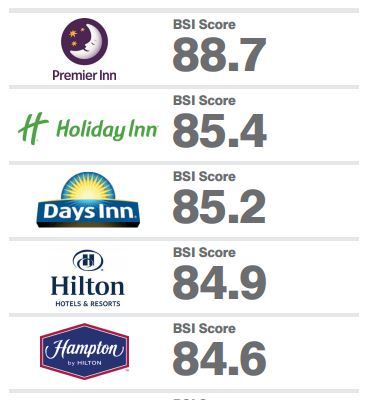With total sales up 12.9% and like-for-like sales up 4.2% in 2015 and 2016, it marks a successful period for the hotel chain.
So, what exactly makes Premier Inn so strong? Here’s a breakdown of its BSI score along with some further insight into what it’s been doing right.
Familiarity and consumer confidence
As one of the first mass market UK hotel chains to be advertised on prime time television, Premier Inn has infiltrated the consumer mind-set as a go-to brand. By using high-profile celebrities in its TV ads, most notably with comedian Lenny Henry, it has further cemented itself into the consumer consciousness.
Alongside this sense of familiarity, Premier Inn has worked hard to instil a sense of confidence in consumers – and this has mainly been achieved by differentiating itself from the competition.
With its ‘great night’s sleep guaranteed’ pledge, it goes above and beyond the promise of convenience or value to offer something that all consumers crave from a night in a hotel – real comfort and a sense that it is a home away from home.
By using its partnership with Hypnos beds in this way, and even going as far as offering a money-back guarantee, it has been able to beat out similar chains that solely rely on factors like low cost.
Emotionally-led campaigns
Having established itself as a well-known and familiar brand, Premier Inn has widened its marketing approach to focus on more emotionally-led campaigns – recently using director Ben Wheatley for a new series of adverts.
‘Great Aunt Mabel’s Birthday’ – a decidedly Wes Anderson-inspired ad – portrays the experience of getting ready for a special birthday party, building on relatable family-driven elements to engage viewers.
Similarly, its ‘Working Girl’ ad depicts a different but similarly emotionally-driven experience of giving an important work presentation, which is conveniently made easier thanks to Premier Inn’s free Wi-Fi, unlimited breakfast and king-size Hypnos beds.
With an emotional response reported to have a far greater influence on a consumer’s intent to purchase than the ad’s content – by a factor of 3-to-1 for television commercials – Premier Inn’s decision to veer into this territory is likely to resonate with consumers.
What’s more, it aims to show the brand in a fresh and multi-faceted light, removing the perception that it’s only about a good night’s sleep.
Value-for-money and employee focus
With value-for-money having a direct influence on consumer satisfaction, Premier Inn’s commitment to offering a quality service for less appears to be at the heart of its success. But more than this, it is its ability to strike a balance between value and quality which sets it apart – and a reason why it has also ranked consistently highly on YouGov’s BrandIndex.
Lastly, with staff satisfaction and corporate reputation contributing to brand strength, Premier Inn’s commitment to equality is also worth a mention.
As well as a student placement scheme, the brand runs the Premier Inn Hospitality Apprenticeship programme to recruit people from diverse class backgrounds, regardless of academic achievement. The chain employs around 700 apprentices in the UK at any one time, offering the opportunity for apprentices to rise up the ranks and even run hotels or large teams at corporate level.
In doing so, it has demonstrated its position as a fair and socially-aware employer, undoubtedly contributing to its status as a powerful brand.
Related reading:


Comments